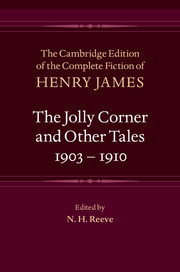Book contents
- Frontmatter
- Contents
- Acknowledgements
- List of Abbreviations
- General Editors’ Preface
- General Chronology of James’s Life and Writings
- Introduction
- Textual Introduction
- Chronology of Composition and Production
- Bibliography
- The Jolly Corner and Other Tales 1903–1910
- Glossary of Foreign Words and Phrases
- Notes
- Textual Variants
- Emendations
- Appendices
IV
Published online by Cambridge University Press: 11 April 2021
- Frontmatter
- Contents
- Acknowledgements
- List of Abbreviations
- General Editors’ Preface
- General Chronology of James’s Life and Writings
- Introduction
- Textual Introduction
- Chronology of Composition and Production
- Bibliography
- The Jolly Corner and Other Tales 1903–1910
- Glossary of Foreign Words and Phrases
- Notes
- Textual Variants
- Emendations
- Appendices
Summary
The autumn was brisk, as Miss Putchin had told them it would be, but business naturally fell off with the winter months and the short days. There was rarely an hour indeed without a call of some sort, and they were never allowed to forget that they kept the shop in all the world, as they might say, where custom was least fluctuating. The seasons told on it, as they tell upon travel, but no other influence, consideration or convulsion to which the population of the globe is exposed. This population, never exactly in simultaneous hordes, but in a full, swift and steady stream, passed through the smoothly-working mill and went, in its variety of degrees duly impressed and edified, on its artless way. Gedge gave himself up, with much ingenuity of spirit, to trying to keep in relation with it; having even at moments, in the early time, glimpses of the chance that the impressions gathered from so rare an opportunity for contact with the general mind might prove as interesting as anything else in the connection. Types, classes, nationalities, manners, diversities of behaviour, modes of seeing, feeling, of expression, would pass before him and become for him, after a fashion, the experience of an untravelled man. His journeys had been short and saving, but poetic justice again seemed inclined to work for him in placing him just at the point in all Europe perhaps where the confluence of races was thickest. The theory, at any rate, carried him on, operating helpfully for the term of his anxious beginnings and gilding in a manner— it was the way he characterised the case to his wife—the somewhat stodgy gingerbread of their daily routine. They had not known many people, and their visiting-list was small—which made it again poetic justice that they should be visited on such a scale. They dressed and were at home, they were under arms and received, and except for the offer of refreshment—and Gedge had his view that there would eventually be a buffet farmed out to a great firm—their hospitality would have made them princely if mere hospitality ever did. Thus they were launched, and it was interesting, and from having been ready to drop, originally, with fatigue, they emerged even-winded and strong in the legs, as if they had had an Alpine holiday.
- Type
- Chapter
- Information
- The Jolly Corner and Other Tales, 1903–1910 , pp. 21 - 26Publisher: Cambridge University PressPrint publication year: 2017

